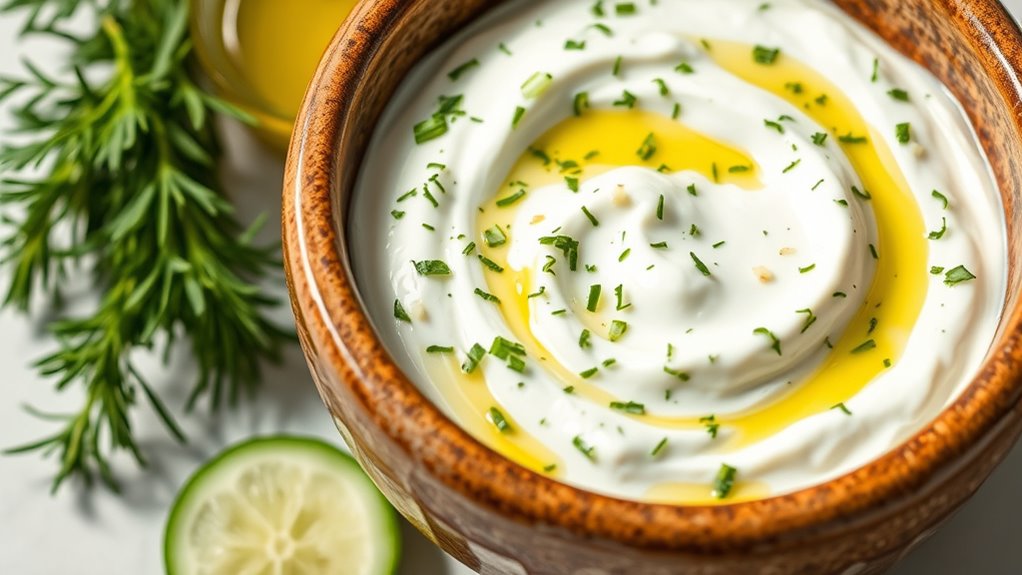When you make authentic Greek tzatziki, you benefit from the probiotic-rich yogurt created through fermentation, which supports your gut microbiome and boosts immunity. Using high-quality milk and controlling fermentation time guarantees your yogurt develops beneficial bacteria and a rich flavor. These probiotics help balance your digestive health and increase nutrient absorption. As you incorporate homemade yogurt into tzatziki, you preserve its traditional taste and health benefits, with more to discover on how fermentation enhances your well-being.
Key Takeaways
- Homemade Greek yogurt provides a rich source of probiotics that enhance gut microbiome health.
- Extended fermentation increases beneficial bacteria, boosting probiotic content in yogurt used for tzatziki.
- The traditional fermentation process develops unique flavors and maximizes probiotic diversity.
- Using high-quality, live-culture yogurt ensures optimal probiotic transfer when preparing tzatziki.
- Consuming homemade tzatziki supports digestive health by nourishing beneficial gut bacteria with authentic probiotics.

Have you ever tasted the true flavor of Greece? If so, you’ve experienced more than just a delicious dip—you’ve savored a piece of Greek culture. Making authentic tzatziki at home allows you to enjoy its rich taste while also reaping the probiotic benefits of traditional yogurt. The secret lies in the fermentation process, which transforms simple milk into a probiotic powerhouse. When you prepare your own yogurt, you control every step, ensuring it’s free from unnecessary additives and preservatives. The fermentation process is what gives Greek yogurt its distinctive tang and thick consistency, as beneficial bacteria convert lactose into lactic acid. This process not only enhances flavor but also boosts the probiotic content, which is excellent for your gut health. Consuming probiotic-rich foods like homemade yogurt can help balance your microbiome, improve digestion, and strengthen your immune system.
Making yogurt from scratch might seem intimidating at first, but it’s straightforward once you understand the basics. You start with high-quality milk, heating it gently before cooling it to the *supreme* temperature for fermentation. Adding a small amount of live yogurt as a starter introduces the beneficial bacteria needed to kick-start the fermentation process. Over several hours, these bacteria multiply, producing lactic acid that thickens the milk into yogurt and imparts that tangy flavor characteristic of authentic Greek yogurt. The longer you allow the fermentation to proceed, the more pronounced the probiotic benefits become, as more beneficial bacteria develop. Keeping the yogurt at a consistent, warm temperature encourages *prime* bacterial growth, resulting in a creamy, nutrient-dense product. Incorporating proper fermentation techniques ensures maximum probiotic benefits and authentic flavor. Additionally, understanding the microbiome can help you optimize your fermentation process for even greater health benefits. For example, selecting the right starter culture influences the diversity and strength of probiotic bacteria, which can further enhance health benefits. Moreover, maintaining a consistent fermentation environment can also improve the overall quality of your homemade yogurt.
Once your yogurt is ready, it’s time to assemble your tzatziki. Combine the homemade yogurt with fresh cucumber, garlic, lemon juice, dill, and a pinch of salt. The quality of your yogurt directly influences the final flavor and texture of the tzatziki, so using your own freshly fermented yogurt guarantees freshness and richness. Not only does this homemade approach preserve the authentic Greek taste, but it also maximizes the probiotic benefits, giving your digestive system a natural boost. Enjoying tzatziki made from your own yogurt offers more than just flavor; it provides a way to support your gut microbiome with beneficial bacteria that thrive through the fermentation process. So, next time you prepare this classic dish, remember—you’re nourishing your body with a true taste of Greece and its healthful traditions.
Frequently Asked Questions
Can Homemade Yogurt Improve Gut Health More Than Store-Bought?
You might find that homemade yogurt improves your gut health more than store-bought because it offers greater probiotic variability. Store-bought options often have consistent strains, but homemade yogurt allows you to customize and increase probiotic diversity. By controlling the fermentation process, you guarantee a richer array of beneficial bacteria, which can support your microbiome better. So, making yogurt at home can boost your gut health more effectively than relying solely on store-bought varieties.
What Specific Probiotics Are Present in Traditional Greek Yogurt?
Imagine opening a treasure chest of health benefits. In traditional Greek yogurt, you’ll find probiotic strains like Lactobacillus bulgaricus and Streptococcus thermophilus, which emerge during yogurt fermentation. These beneficial bacteria support your gut by balancing microbiome diversity. By choosing authentic Greek yogurt, you embrace these probiotic strains, enhancing digestion and immunity naturally. So, enjoy every spoonful, knowing you’re nourishing your microbiome with the power of genuine yogurt fermentation.
How Does Fermentation Affect the Microbiome Diversity in Yogurt?
Fermentation process plays a key role in enhancing microbiome diversity in yogurt. As you ferment milk, beneficial bacteria like Lactobacillus and Bifidobacterium multiply, increasing the variety of microbes. This process not only improves flavor and texture but also boosts the probiotic content. By fermenting your yogurt properly, you support a healthier microbiome, which can positively impact digestion, immunity, and overall gut health.
Are There Any Risks of Contamination in Homemade Yogurt?
Imagine you’re making yogurt at home, but neglect home sanitation—this increases contamination risks, risking harmful bacteria growth. Contamination can occur from unclean utensils or improper storage, leading to foodborne illnesses. To minimize risks, always sterilize equipment, keep your workspace clean, and store yogurt properly. By maintaining good hygiene, you reduce contamination risks and ensure your homemade yogurt is safe and healthy to enjoy.
How Long Does Homemade Yogurt Retain Its Probiotic Benefits?
You might wonder how long your homemade yogurt keeps its probiotic benefits. Generally, proper storage duration is about 1 to 2 weeks in the refrigerator, which helps maintain probiotic stability. To maximize benefits, always keep it in an airtight container and avoid frequent temperature changes. After this period, probiotics can diminish, so for ideal probiotic intake, consume your homemade yogurt within this timeframe.
Conclusion
Making your own Greek tzatziki not only boosts flavor but also enhances your microbiome with beneficial probiotics from homemade yogurt. Did you know that traditional fermented foods like yogurt can contain up to 10 billion live cultures per serving? By preparing it yourself, you guarantee these good bacteria thrive, supporting digestion and overall health. So, enjoy your authentic tzatziki knowing you’re nourishing your gut while savoring a delicious, homemade treat!









